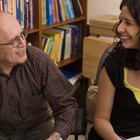
LWA/Sharie Kennedy/Blend Images/Getty Images
An important component of explaining something clearly is understanding the needs of your audience. Taking into account a listener's age, developmental stage and level of understanding can provide a good starting point for explaining yourself in a way that is clear and understandable. This may require your planning what you say in advance.
Be Concise and Aware
As you explain a situation or idea, do so succinctly and give the person you are talking to a chance to both ask questions and provide feedback. This will help you gauge your listener's understanding, in addition to providing you with an opportunity to clarify your point, if necessary. While explaining, look for nonverbal cues, such as nodding or frowning, that indicae the listener understands what you are saying. If she appears confused, take a moment to check in and directly ask if she understands you. When you get feedback from your listener, be attentive and non-judgmental, advise Lawrence Robinson, Jeanne Segal and Robert Segal of HelpGuide.org in their article "Effective Communication."
Related Articles

How to Respond to a Compliment From a ...

Examples & Tips for Setting Boundaries ...

How to Cope With a Disrespectful ...

Thank-you Note Etiquette for an ...

How to Deal With a Demanding Girlfriend

How to Be a Good Communicator

How to Give a Polite Refusal

What Is the Meaning of Judgmental?

Positive Communication Techniques

How to Make Amends for Mistakes

How to Stop Finding Fault

Is Effective Communication a Two-Way ...

Five Benefits of Attentive Listening

How to Deal With Judgmental People

How to Deal With a Neurotic Person

How to Communicate with People Pleasers

How to Write a Letter of Remorse

Boundaries & Expectations Exercises

Effective Face-to-Face Communication

Components of Effective Communication
References
Writer Bio
Anna Green has been published in the "Journal of Counselor Education and Supervision" and has been featured regularly in "Counseling News and Notes," Keys Weekly newspapers, "Travel Host Magazine" and "Travel South." After earning degrees in political science and English, she attended law school, then earned her master's of science in mental health counseling. She is the founder of a nonprofit mental health group and personal coaching service.
Photo Credits
LWA/Sharie Kennedy/Blend Images/Getty Images